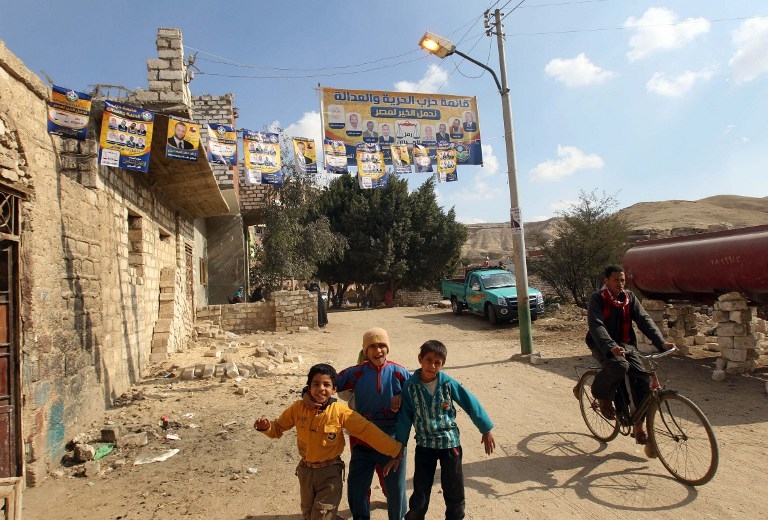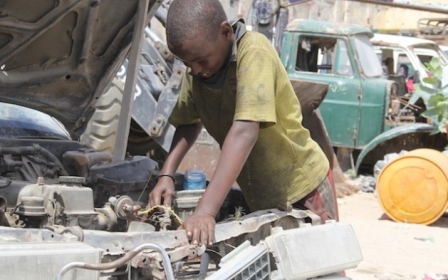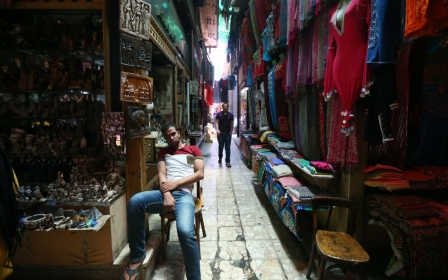Outcry over Egypt op-ed calling for slaughter of street children

University professor Nasser Abdallah’s op-ed calling for the mass slaughter of street children in Egypt was removed from the website of the privately-owned newspaper Al-Masry Al-Youm on Friday following public outcry.
The article, titled 'The Brazilian solution' suggested that the 'solution' to the problem of street children in Egypt is to follow what Nasser described as the Brazilian example referring to the killing of homeless children by Brazilian security forces in the 1990s.
"In the 1990s, street children in Brazil's major towns turned from a source of annoyance to a source of terror, increasingly committing crimes including rape, prostitution and murder, while the economic situation of Brazil was similar to Egypt’s present condition," wrote the academic as he drew parallels between economic challenges in Egypt and Brazil in the 1990s.
“The Brazilian solution managed to clear the main Brazilian roads of street children and push those who remained [alive] to go back to the slums. But this success was not due to the harsh Brazilian solution, but first and foremost to the Brazilian political leadership’s will for reform,” said the academic in his article as he suggested street children could be cleared like stray dogs and explained that the alternative of rehabilitation would be costly.
“This is the lesson that should be understood from everyone wishing to learn from the Brazilian experience,” he added.
The article seemingly referred to the infamous Candelária massacre in Rio de Janeiro on the eve of 23 July 1993 which created local and international uproar. The incident involved the kiilling of eight homeless children outside the Candelária cathedral by a group of men including police.
Two of the men were found guilty and received severe sentences for their crime.
Thousands of Egyptians criticised the article on social media calling on the newspaper to pull the op-ed and apologise, while several columnists criticised the writer.
Columnists Bassel Ramsis, called the writer a fascist and noted that the article underlined a decay of human values.
After initially publishing the piece, Almasry Alyoum withdrew the article and released a statement saying the piece was taken down due to its incitement of violence.
“The newspaper published the article based on the reader’s right to knowledge, and in an exercise of the right of free speech. But once again, with respect to the rights of the reader and society, we removed it,” read the statement.
Nelly Ali, a PhD candidate at the University of London and an activist supporting Egyptian street children, criticised Abdullah's article in her blog calling on his arrest for hate speech.
"Street children are but a symptom of the ills, not only of society but of delusional and weak governments and states that cannot stop the vulnerable children from escaping abusive homes and adults and finding refuge in the dangers of the street," she said Ali in her post.
Ali who also commented in Egyptian satellite TV recounted the events of Candelária noting that the writer had inaccurately referenced the incident to suggest an alarming solution.
In statements to Radio Netherlands Worldwide's Arabic website, "Hunasotak" Abdullah denied that he called for the mass killing of street children while insisting that his piece was misunderstood.
"All I want to say in my op-ed is that the Brazilians were brave enough to take such decisions and succeeded in reform to the degree that such horrifying decisions like killing street children would pass without any legal consequence, as they succeeded in solving that problem in general," the professor of moral and political philosophy said, insisting that he was totally against the killing of street children.
The Egyptian Coalition for Children's Rights filed a complaint with the general prosecutor against Nassar and Almasry Alyoum for publishing the piece.
Abdallah an academic in the University of Sohag's philosophy department won the high-profile State Honorary Award in Art in 2009, is a founding member of the Writers Union and is known for his poetry, novels, philosophical and literary studies.
Estimates of the numbers of homeless children in Egypt vary considerably due to the difficulty of quantifying the phenomenon. UNICEF has stated that NGOs estimate there are at least tens of thousands of street children in the country, most of them in the cities of Cairo and Alexandria.
New MEE newsletter: Jerusalem Dispatch
Sign up to get the latest insights and analysis on Israel-Palestine, alongside Turkey Unpacked and other MEE newsletters
Middle East Eye delivers independent and unrivalled coverage and analysis of the Middle East, North Africa and beyond. To learn more about republishing this content and the associated fees, please fill out this form. More about MEE can be found here.




